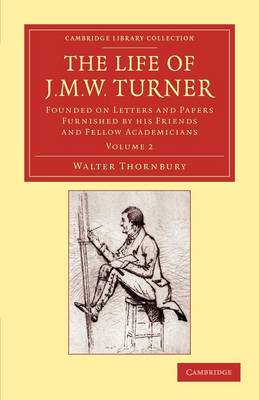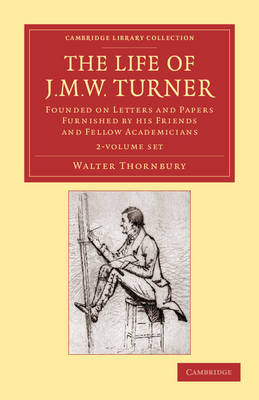Cambridge Library Collection - Art and Architecture
1 primary work • 4 total works
Volume 2
This pioneering two-volume biography, first published in 1862, explores the genius of the groundbreaking Romantic landscape and historical painter J. M. W. Turner (1775–1851). As both journalist and historian, author Walter Thornbury (1828–76) has a light touch, yet he draws on a wide range of correspondence, sketchbooks, watercolours and etchings to give a detailed picture of Turner's artistic development and connections, and his increasingly eccentric character. Volume 2 fills out the record by detailing the artist's relationships with patrons such as Lord Egremont of Petworth House, and such fellow Royal Academicians as the sculptor Sir Francis Chantrey. Among the topics covered here are Turner's love of poetry, dealings with buyers, miserliness (or otherwise), the tailing off of his powers, and his final mysterious metamorphosis into 'Admiral Booth'. Advised by Ruskin not to try to 'mask the dark side' of his subject, Thornbury presents a rounded but still admiring picture of his hero.
This pioneering two-volume biography, first published in 1862, explores the genius of the groundbreaking Romantic landscape and historical painter J. M. W. Turner (1775-1851). As both journalist and historian, author Walter Thornbury (1828-76) has a light touch, yet he draws on a wide range of correspondence, sketchbooks, watercolours and etchings to give a detailed picture of Turner's artistic development and connections, and his increasingly eccentric character. Volume 1 traces the artist's progress from humble cockney beginnings to his establishment as a Royal Academician at the heart of the nineteenth-century art world. Volume 2 fills out the record by detailing the artist's relationships with patrons such as Lord Egremont of Petworth House, and such fellow Royal Academicians as the sculptor Sir Francis Chantrey. Advised by Ruskin not to try to 'mask the dark side' of his subject, Thornbury presents a rounded but still admiring picture of his hero.
This pioneering two-volume biography, first published in 1862, explores the genius of the groundbreaking Romantic landscape and historical painter J. M. W. Turner (1775–1851). As both journalist and historian, author Walter Thornbury (1828–76) has a light touch, yet he draws on a wide range of correspondence, sketchbooks, watercolours and etchings to give a detailed picture of Turner's artistic development and connections, and his increasingly eccentric character. Volume 1 traces the artist's progress from humble cockney beginnings, through youthful friendship and rivalry with Thomas Girtin and a stint as a drawing-master, to his establishment as a Royal Academician at the heart of the nineteenth-century art world. Thornbury sees Turner from all angles, covering his travels at home and abroad, his watercolour and printmaking techniques, his love of sea and sky and colour gradations, and even his fraught monetary dealings. The author also fully contextualises great works like Ulysses Deriding Polythemus and The Fighting Temeraire.
This pioneering two-volume biography, first published in 1862, explores the genius of the groundbreaking Romantic landscape and historical painter J. M. W. Turner (1775–1851). As both journalist and historian, author Walter Thornbury (1828–76) has a light touch, yet he draws on a wide range of correspondence, sketchbooks, watercolours and etchings to give a detailed picture of Turner's artistic development and connections, and his increasingly eccentric character. Volume 2 fills out the record by detailing the artist's relationships with patrons such as Lord Egremont of Petworth House, and such fellow Royal Academicians as the sculptor Sir Francis Chantrey. Among the topics covered here are Turner's love of poetry, dealings with buyers, miserliness (or otherwise), the tailing off of his powers, and his final mysterious metamorphosis into 'Admiral Booth'. Advised by Ruskin not to try to 'mask the dark side' of his subject, Thornbury presents a rounded but still admiring picture of his hero.


